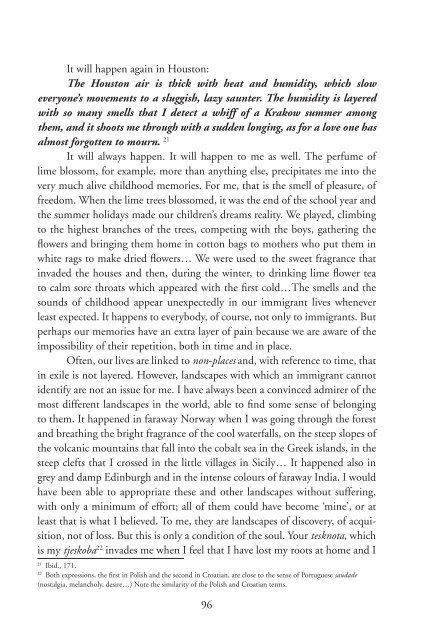Teaching Subjectivity. Travelling Selves for Feminist ... - MailChimp
Teaching Subjectivity. Travelling Selves for Feminist ... - MailChimp
Teaching Subjectivity. Travelling Selves for Feminist ... - MailChimp
You also want an ePaper? Increase the reach of your titles
YUMPU automatically turns print PDFs into web optimized ePapers that Google loves.
It will happen again in Houston:<br />
The Houston air is thick with heat and humidity, which slow<br />
everyone’s movements to a sluggish, lazy saunter. The humidity is layered<br />
with so many smells that I detect a whiff of a Krakow summer among<br />
them, and it shoots me through with a sudden longing, as <strong>for</strong> a love one has<br />
almost <strong>for</strong>gotten to mourn. 21<br />
It will always happen. It will happen to me as well. The perfume of<br />
lime blossom, <strong>for</strong> example, more than anything else, precipitates me into the<br />
very much alive childhood memories. For me, that is the smell of pleasure, of<br />
freedom. When the lime trees blossomed, it was the end of the school year and<br />
the summer holidays made our children’s dreams reality. We played, climbing<br />
to the highest branches of the trees, competing with the boys, gathering the<br />
flowers and bringing them home in cotton bags to mothers who put them in<br />
white rags to make dried flowers… We were used to the sweet fragrance that<br />
invaded the houses and then, during the winter, to drinking lime flower tea<br />
to calm sore throats which appeared with the first cold…The smells and the<br />
sounds of childhood appear unexpectedly in our immigrant lives whenever<br />
least expected. It happens to everybody, of course, not only to immigrants. But<br />
perhaps our memories have an extra layer of pain because we are aware of the<br />
impossibility of their repetition, both in time and in place.<br />
Often, our lives are linked to non-places and, with reference to time, that<br />
in exile is not layered. However, landscapes with which an immigrant cannot<br />
identify are not an issue <strong>for</strong> me. I have always been a convinced admirer of the<br />
most different landscapes in the world, able to find some sense of belonging<br />
to them. It happened in faraway Norway when I was going through the <strong>for</strong>est<br />
and breathing the bright fragrance of the cool waterfalls, on the steep slopes of<br />
the volcanic mountains that fall into the cobalt sea in the Greek islands, in the<br />
steep clefts that I crossed in the little villages in Sicily… It happened also in<br />
grey and damp Edinburgh and in the intense colours of faraway India. I would<br />
have been able to appropriate these and other landscapes without suffering,<br />
with only a minimum of ef<strong>for</strong>t; all of them could have become ‘mine’, or at<br />
least that is what I believed. To me, they are landscapes of discovery, of acquisition,<br />
not of loss. But this is only a condition of the soul. Your tesknota, which<br />
is my tjeskoba 22 invades me when I feel that I have lost my roots at home and I<br />
21<br />
Ibid., 171.<br />
22<br />
Both expressions, the first in Polish and the second in Croatian, are close to the sense of Portuguese saudade<br />
(nostalgia, melancholy, desire…) Note the similarity of the Polish and Croatian terms.<br />
96

















